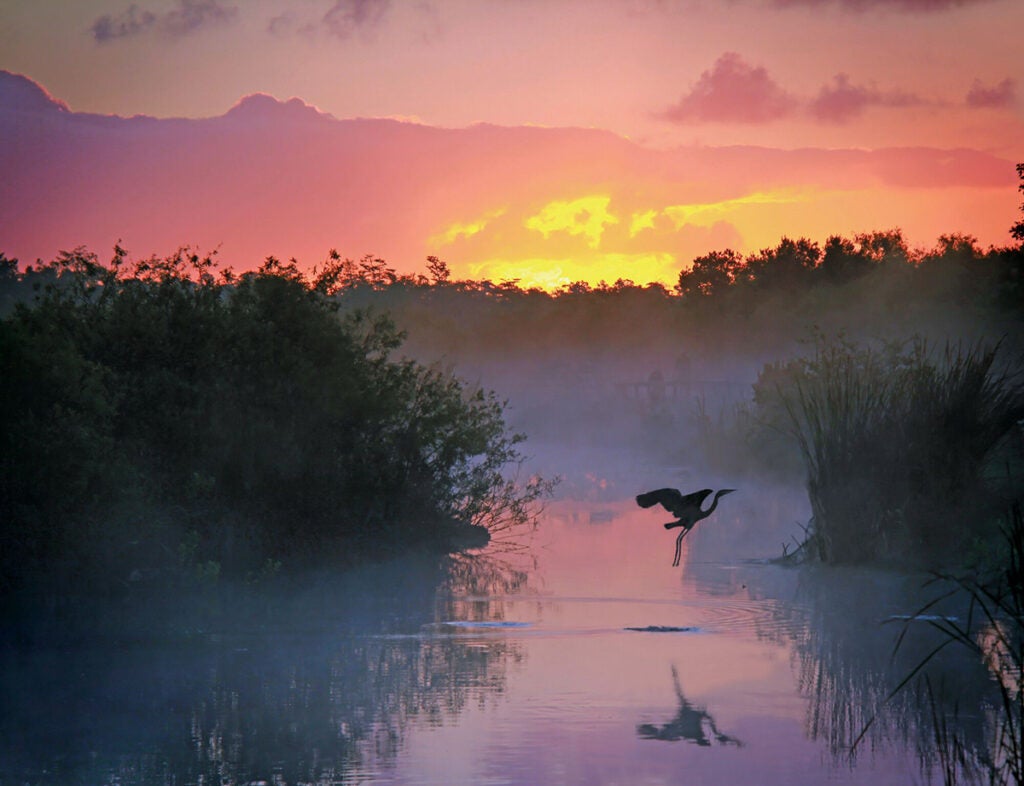Media Inquiries
Julie Hauserman
Public Affairs and Communications Strategist
jhauserman@earthjustice.org
Legal Assistance Inquiries
Contacto de Prensa
Robert Valencia
Estratega de Comunicaciones y Asuntos Públicos Hispanos/Latinos
rvalencia@earthjustice.org
The Florida regional office wields the power of the law to protect our waterways and biodiversity, promote a just and reliable transition to clean energy, and defend communities disproportionately burdened by pollution. The Florida regional office works through partnership to hold government accountable and the public informed and engaged on the most pressing environmental issues of our time.
Our Impact
Protecting our Waterways and Wildlife
- The exceptionally biodiverse Apalachicola River, Floodplain, and Bay face devastation from the U.S. Army Corps of Engineers’ restriction of freshwater flows from upstream dams and reservoirs. Earthjustice represents National Wildlife Federation, Florida Wildlife Federation, and Apalachicola Riverkeeper in a challenge to the Corps’ operations.
- Florida’s vast wetlands are essential to wildlife, hurricane resilience and drinking water. In 2020, the U.S. Environmental Protection Agency (EPA) authorized Florida to permit dredging and filling of wetlands protected under the Clean Water Act by sidestepping essential federal protections. Other states have shown interest in this “model,” raising the stakes nationally. Earthjustice has challenged EPA’s action in Washington, D.C., representing the Center for Biological Diversity (CBD), the Conservancy of Southwest Florida, Defenders of Wildlife, the Florida Wildlife Federation, Miami Waterkeeper, Sierra Club, and St. Johns Riverkeeper.
- Vehicle strikes are the leading cause of death for the critically endangered Florida panther. As roads are widened for burgeoning development, rigorous environmental protection is needed more than ever. But U.S. Fish and Wildlife Service (USFWS) is failing to limit how many panthers may be killed before the government must reassess projects. Earthjustice is suing on behalf of Sierra Club and the Environmental Confederation of Southwest Florida (ECOSWF).
- Manatees in Florida are dying at high rates as water pollution kills their main food source. Florida has repeatedly failed to rein in the sources of this pollution. Representing Save the Manatee Club, Defenders of Wildlife, and CBD, Earthjustice is suing EPA for failing to step in.
- In 2025, attorneys of the Florida office were honored with the Conservationists of the Year award from the state’s environmental community for their fight to protect the Florida wetlands. In 2024, this litigation team successfully challenged — and overturned — a state takeover of federal wetlands permitting, returning wetland permitting to the U.S. Army Corps of Engineers, and restoring Endangered Species Act protections.
Promoting a Just and Reliable Transition to Clean Energy
The Sunshine State should be leading the way toward a clean and equitable energy system, but instead is bowing to powerful utility interests seeking ever-higher profits at the expense of low-income communities and communities of color.
- Earthjustice is pushing back against utility-driven faux “community solar” programs that make for good PR but are designed to benefit mostly the utilities and their largest customers while undermining a true transition to solar energy. On behalf of the League of United Latin American Citizens of Florida (LULAC), Earthjustice challenged the Public Service Commission’s (PSC) approval of one such program at the Florida Supreme Court, which ruled 6 to 1 that the PSC had not adequately explained the approval.
- On behalf of Florida Rising, LULAC, and ECOSWF, Earthjustice is also challenging Florida Power & Light Company’s (FPL) recent effort to expand its own faux “community solar” program through a settlement with friendly parties that gives the utility the largest rate increase in Florida history to subsidize FPL’s largest customers.
- Earthjustice continues to hold the line on energy efficiency, the cheapest and easiest way to reduce electric bills and greenhouse gas emissions. Having defeated FPL’s plan to adopt zero energy efficiency and demand-side management goals, Earthjustice continues to fight to reform the goal-setting process in order to incentivize energy efficiency.
Standing With Communities Burdened by Pollution
Communities of color and low-income communities disproportionately bear the burdens of pollution harms. Florida’s Department of Environmental Protection (DEP) has failed to ensure non-discrimination in its permitting programs as required under federal law.
- Florida’s incinerators are overwhelmingly in Black and brown communities, threatening residents’ health and quality of life. Touted as “clean energy,” waste incineration is anything but: it is an outdated practice that converts waste into toxic ash and air pollution. Earthjustice is fighting back alongside its partner Florida Rising to challenge a polluting incinerator in a Latinx community in Miami and to enforce civil rights protections.
- Alongside American Friends Service Committee, Earthjustice exposed environmental hazards at the Homestead detention center for unaccompanied migrant children, located next to a Superfund site, and sued to compel the release of related records under the Freedom of Information Act. In partnership with immigrant rights’ groups, Earthjustice demanded that EPA investigate the harmful use of chemical disinfectants at the Glades County Detention Center.
- Earthjustice is challenging EPA’s unconditional registration of the antibiotic Streptomycin as a pesticide for citrus without assessing health harms to farmworkers, impacts to endangered species, or the risk of accelerating antibiotic resistance. Along with Natural Resources Defense Council and CBD, Earthjustice represents Farmworker Association of Florida, Farmworker Justice, Migrant Clinicians Network, Beyond Pesticides, and ECOSWF.
Supporting A Clean Energy Future in Puerto Rico
More than 1.1 million Puerto Ricans reside in Florida, making it the largest concentration of Puerto Ricans in the diaspora. Puerto Rico is at the frontline of climate change, extreme weather, and air pollution. Nearly half the population lives under the poverty line.
- In 2017, Hurricane Maria set off a ten-month blackout — the longest in U.S. history — resulting in the unprecedented loss of 3,000 lives. This avoidable tragedy demonstrated the life and death consequences of public access to electricity.
- In 2019, Earthjustice challenged the Puerto Rico Electric Power Authority’s (PREPA) 20-year energy plan, which largely recreated the same old system, on behalf of Alliance for Renewable Energy Now. The Puerto Rico Energy Bureau denied plans for new LNG terminals and gas conversions, ordered an aggressive renewables procurement plan, embraced the distributed solar and storage model, and ordered the creation of energy efficiency programs.
- In 2020, the Energy Bureau began a proceeding to set performance metrics for LUMA Energy, the private company now in charge of energy in Puerto Rico. Earthjustice is working with partners and clients to make sure that performance metrics ensure a reliable energy system prioritizing distributed rooftop solar over a continued dependency on fossil fuels.
- With almost 90% of food on the island being imported, Earthjustice is supporting local groups opposing large-scale industrial solar projects on prime agricultural land or preserves that are essential to food security. Industrial solar farms have long-term impacts on soil and are unreliable in Puerto Rico, because they rely on vulnerable transmission lines across densely-forested areas.
- AES-Puerto Rico is the most polluting plant in Puerto Rico and the source of coal ash contamination that threatens public health. Earthjustice is working toward the closure and cleanup of the plant.

